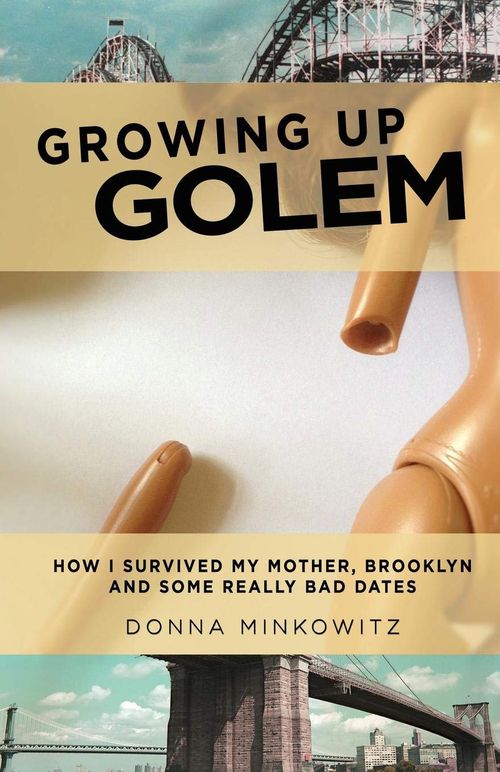Growing Up Golem
How I Survived My Mother, Brooklyn and Some Really Bad Dates
Donna Minkowitz

Throughout the course of the book, Minkowitz profiles her thorny adult relationships, attributing their maladies to her grisly, freaky upbringing as well as her battle with Repetitive Strain Injury (RSI), which limits use of her arms and hands.
Minkowitz thinks of herself as a Golem, a Jewish mythical creature created by a rabbi or mystic to protect the Jewish people from pogroms. The two defining characteristics of Golems are: A) they possess superhuman brute strength, and B) they have no self-determination; they are absolutely subject to the will of their creators.
In Minkowitz’s case, she imagines that her mother is her makernot by way of birth, but rather by way of building, fashioning with her own hands and creative impulse. Minkowitz describes her mother’s various abuses, manipulations, and volatility in painful detail and cites them, throughout the book, as the root of her own neuroses. The telling becomes a catalogue of the strange and ill-conceived ways her parents (particularly her mother) treated her as the cause of various deficits in her adult life.
While this might seem like straightforward psychology, Minkowitz itemizes the evils and complexities of her family dynamic in a way that fiddles with the reader’s sympathies. She draws readers into her own brand of self-deprecation in a way that dis-invites reader into an easy direct participation in her journey. The writing calls into question the narrator’s reliability just enough to make the story of genuine abuse come off as charming.
Minkowitz uses humor to work through her most traumatic family experiences. There are many moments when her tone and phrasing hit the mark, for example in the line, “Hearken, reader: I am built small and cannot take very much in the vagina.” Conversely, Minkowitz’s use of diminutive and often infantilizing pet names for her readers (“doll,” “best beloved,” “gentle reader,” “sweet little reader,” “honey buns,” and “sweet pea”) might leave readers wondering if these diminutions are meant to be insulting, fanciful, intimate, or droll.
Yet the narrative voice is rife with contradictory approaches to whatever pickles she finds herself in. On one hand, Minkowitz presents herself as helpless in the face of the wills of those around her. On the other hand, she also relays incidents in which she asserts herself (in some cases audaciously). This changeable narrative voice makes for a conflicting and complex reading experience.
She both reviles and revels in her perceived helplessness, to the reader’s amusement and sometimes frustration. While Minkowitz’s stance on her own will-less-ness might come off as self-congratulatory to some, to others, her wry attitude might read as hilariously vexed. Readers grapple along with Minkowitz to make sense of her past as it informs her adult identity.
“Oh fuck, reader,” Minkowitz cries. “I can’t pretend anymore not to care about this. Sadness everywhere, so thick around my chest it makes me tight, makes me quiet.” From this and a number of other passages, readers suspect Minkowitz to be going through this self-excavation as she writes, as we read, right before our eyes. Anger, humiliation, jealousy, exuberance. Hindsight is reserved for the future. This is raw.
Apropos of this immediacy, in a book largely about abuse and disability, it is the sex scenes that pack the most power, particularly those involving the character Gemma. Here, all the intricacies and seeming contradictions of Minkowitz’s journey unite in all their troubled, ennobled complexity. Titillating and exultant, all the emotions Minkowitz spends a majority of the book describingpain, confusion, ecstasy, anxiety, and debilitating longingare shown here in high-def.
An exasperation, a confession, a purging. Mid-chapter, after clicking one episode shut, Minkowitz asks, “What else?” as if the direction the book takes is being decided upon in that very instant. The narrator’s struggle to find her way is palpable, giving an unconstrained impression of a raucous, yet still-tender mind at work. ~ Sarah Burghauser
Check for it on:
Details
| ISBN | 9781936833603 |
| Genre | Autobiography/Biography; Jewish Interest |
| Publication Date | 2013 |
| Publisher | Riverdale Ave Books/Magnus |
| Format | Paperback |
| No. of Pages | 216 |
| Notes | Lambda Literary Award Finalist, Lesbian Memoir/Biography |
| Language | English |
| Rating | Good |
| BookID | 5052 |
